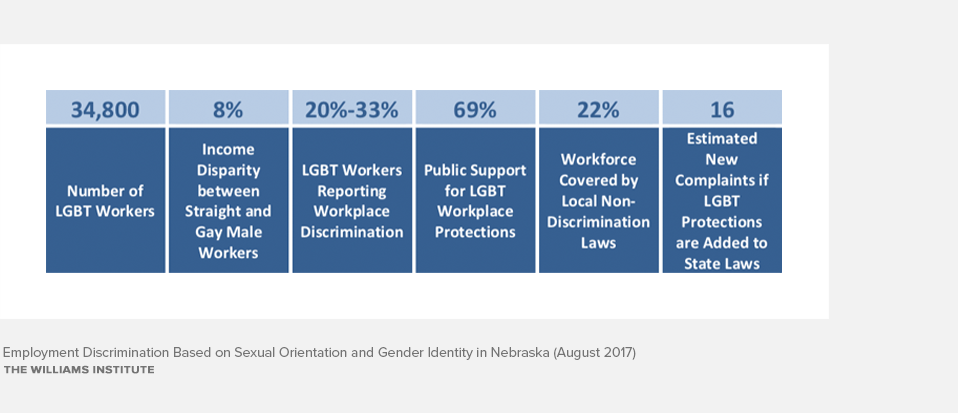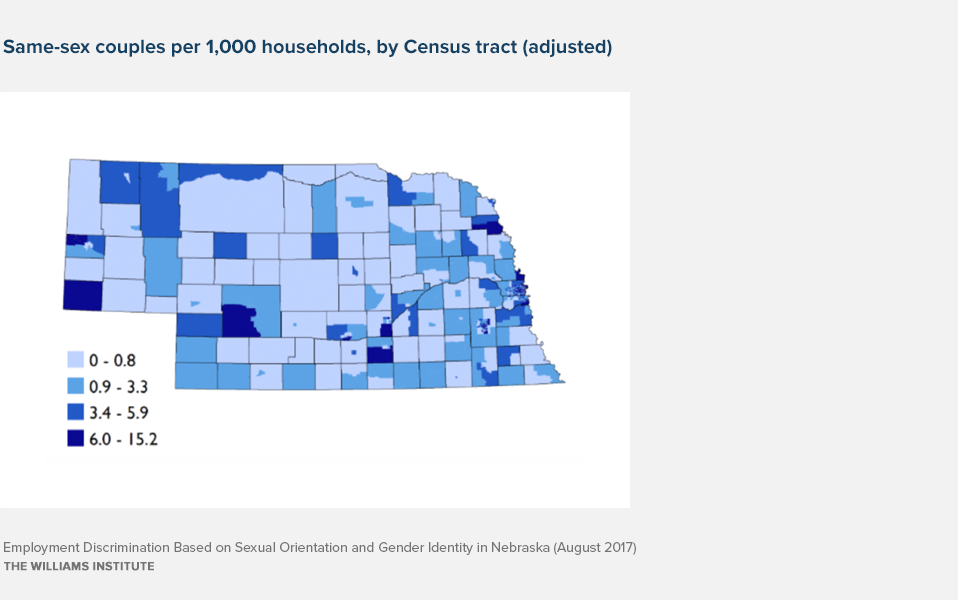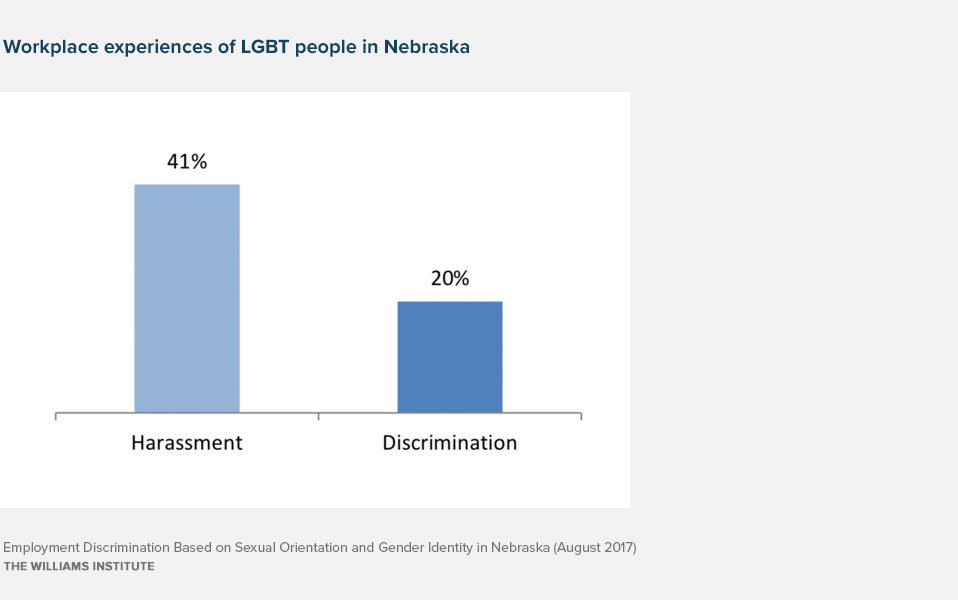Executive Summary
More than 4% of the American workforce identifies as lesbian, gay, bisexual, or transgender (LGBT). Approximately 34,800 of these workers live in Nebraska. Nebraska does not have a statewide law that prohibits discrimination based on sexual orientation or gender identity in employment.
This report summarizes recent evidence of sexual orientation and gender identity employment discrimination, explains the limited current protections from sexual orientation and gender identity employment discrimination in Nebraska, and estimates the administrative impact of passing a law prohibiting employment discrimination based on these characteristics in the state.
Key Findings
LGBT People in Nebraska Experience Discrimination and Harassment in the Workplace
- In total there are approximately 39,500 LGBT people aged 16 and older in Nebraska, including 34,800 who are part of Nebraska’s workforce.
- Instances of employment discrimination based on sexual orientation and gender identity in Nebraska have been documented in legislative testimony and in reports to community-based organizations. Examples include instances of discrimination against public and private sector workers.
- Surveys indicate that LGBT people in Nebraska experience employment discrimination. A 2014 Human Rights Campaign survey of LGBT people in Nebraska found that over 20% of respondents reported that they had experienced employment discrimination, and 41% reported that they had experienced harassment at work. A 2010 survey of LGBT people in Omaha similarly found that 33% of respondents reported that they had experienced employment discrimination.
- National surveys also confirm that discrimination against LGBT workers persists. For example, a 2015 Human Rights Campaign survey found that 47% of LGBT people reported that they had experienced employment discrimination, and a 2013 Pew Research Center survey found that 21% of LGBT respondents reported having been treated unfairly by an employer in hiring, pay, or promotions.
- When transgender people are surveyed separately, they report similar or higher levels of discrimination. The 2015 U.S. Transgender Survey report found that 27% of survey respondents reported being fired, denied a promotion, or not being hired for a job they applied for in the year prior to the survey because of their gender identity, and 15% reported being verbally, physically, or sexually harassed at work in the year prior to the survey because of their gender identity in the year prior to the survey.
- Census data show that in Nebraska, the median income of men in same-sex couples is 8% lower than men in different-sex marriages.
Local Governments and Private Employers in Nebraska Have Made Efforts to Protect LGBT People from Workplace Discrimination and Harassment
- One locality in Nebraska, Omaha, has adopted an ordinance prohibiting public and private sector employment discrimination based on sexual orientation or gender identity.
- Omaha’s ordinance protects approximately 22% of Nebraska’s workforce from discrimination based on sexual orientation and gender identity.
- Private companies may adopt internal non-discrimination policies to improve recruitment and retention of talented employees, to increase employee productivity and customer satisfaction, or to attract a larger customer base. Eight of Nebraska’s ten largest private-sector employers all have internal policies that prohibit discrimination based on sexual orientation, and seven also prohibit discrimination based on gender identity. Additionally, Nebraska’s three largest public university branches all prohibit employment discrimination based on sexual orientation and gender identity.
Public Opinion in Nebraska Supports the Passage of Non-Discrimination Protections for LGBT People
- In response to a national poll conducted in 2011, 69% of those polled in Nebraska said that Congress should pass a federal law to prohibit employment discrimination based on sexual orientation and gender identity.
- A 2016 poll of Nebraska residents found that 74% of Nebraskans favored laws protecting LGB people from employment discrimination.
- In addition, other polls have found that 79% of Nebraska residents think that LGBT people experience discrimination in the state.
A Statewide Law Prohibiting Discrimination Based on Sexual Orientation and Gender Identity in Nebraska Would Not Be Administratively Burdensome or Costly to Enforce
- Adding sexual orientation and gender identity to the Nebraska Fair Employment Practice Act would result in approximately 16 additional complaints, on average, being filed with the Nebraska Equal Opportunity Commission or courts each year.
- The anticipated new complaints based on sexual orientation and gender identity could likely be absorbed into the existing system with no need for additional staff and negligible costs.
Download the full report


